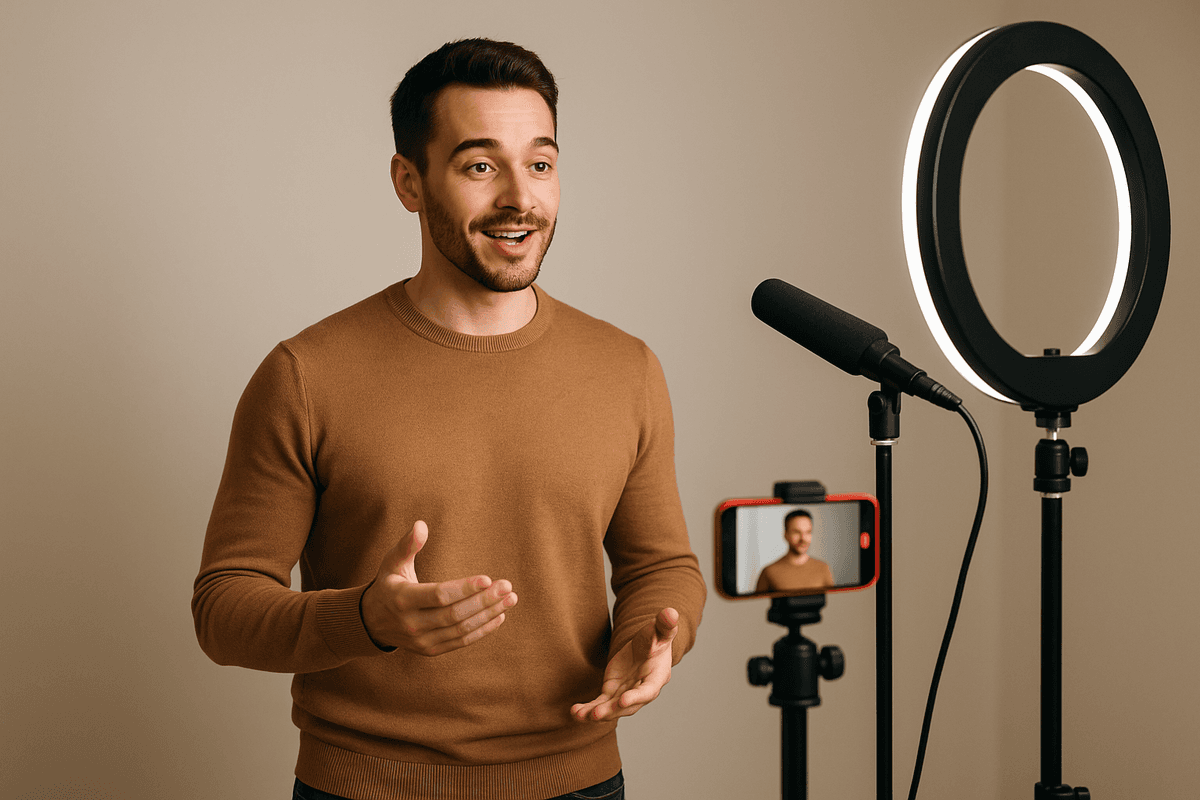How to build your personal brand as an actor
Published: 10/7/2024

Create your actor website on ActorCV
Create a standout actor brand to attract casting directors
Ideally, what you want is to set yourself apart from other actors and open new doors. If you understand the importance of creating a unique brand and market it, you’re on a good path. Examples include developing your image and showcasing your unique talents. In this article, we’ll explore strategies for developing an actor brand that sparks the curiosity of casting directors.
Six brand and marketing strategies for actors
1. Understand your unique selling points
Every actor has unique qualities and talents that make them stand out, and that includes you. This is all about defining what your qualities as an actor are and which ones that make you different from other actors. Identify these unique selling points (USPs) as a first step in building your personal brand by reflecting on what you do well. To help yourself you could also reflect on other actors that you know, that don't have the skills or competencies that you do.
Identify your strengths
What sets you apart from other actors? Is it your comedic timing, emotional depth, physical agility, or something else? Some other examples of USPs could be playing an instrument well, a previous creative/business career, speaking different languages and experience in a sport.
Define your niche
What types of roles and genres do you excel in? Focus on a niche to help you become a go-to actor for specific character types. There are many avenues you could go down when it comes to your future acting career; voice acting, theatre acting, film, children's shows and more.
2. Create a professional actor website
Actor websites are your gateway for branding yourself as an actor. It showcases your skills, experience and actor footage in your personal style. This means that everything you upload to your website aligns with you as an actor, such as choosing a professional headshot with a strong look that enhances your personality.
Headshots
Invest in high-quality headshots that capture your essence and versatility. This is such a good opportunity to showcase your unique side as an actor. The most important thing with actor headshots is that you make a clear decision of what you are expressing — do you want to showcase your bubbly personality by smiling, or go for a more subtle look to add some depth?
Remember to update your actor headshots regularly to reflect your current look.
CV
Keep your actor CV updated with your latest roles, training, and skills. Highlight significant achievements and experiences to help casting directors understand how you stand out as an actor. Your CV should be clear, easy to navigate and show what type of actor you are. If you submit your CV for a role where you're expected to play a certain role, then add a professional headshot that enhances that specific look or quality.
Showreel
Compile a showreel with clips from your best performances. The idea is to showcase a range of emotions and characters to demonstrate your versatility. It's better to select a few longer scenes rather than many short ones, so that casting directors can get a real chance to understand the scene and your contribution to it. Keep your showreel concise and avoid adding a soundtrack so the viewer can hear the dialogue.
3. Build an online presence
Casting directors expect you to have a strong online presence in 2024. It looks professional, it’s easy to share, and adds to your credibility as an actor. One way of looking at this is — how you portray yourself online affects how the casting director, that chooses to showcase you to the director, looks. It's all connected. If you have a strong online presence, it will also make the casting director look good.
Website
Create a professional website including a short presentation of yourself, your CV, showreel, headshots, showreel, skills and contact information.
Create your ActorCV website here and share with casting directors today.
Social media
Use social media platforms such as Instagram, Twitter, and LinkedIn to connect with industry professionals and fans. Share behind-the-scenes content, updates on your projects, and engage with your audience. If you are just starting out, focus on one platform. As you get more experience you can move on to other platforms, but allow this to happen with time.
YouTube/Vimeo
Consider uploading your showreel, short films, and any monologues to video platforms like YouTube and Vimeo. This can increase your visibility and showcase your talents to a wider audience. YouTube is useful as it is an established social media platform where loads of people view educational and inspirational content. The strength of platforms like Vimeo is that it offers high-definition videos to an audience that is potentially on there as their main interest is craftsmanship.
4. Network strategically
Building a network of industry contacts is part of marketing as an actor. It often leads to auditions, collaborations, and mentorship opportunities. Explore networking both IRL and online to get the best effect and keep things more fun. Some actors find that they get more energy from networking at in-person events even though it can feel more daunting than sending an email. Other actors find networking overall draining, in which case it's important to find a sustainable way to network and focus on some self-care from time to time.
Attend industry events
Participate in film festivals, acting workshops, and industry mixers. These events are excellent opportunities to meet casting directors, agents, and fellow actors. Try approaching these events as an opportunity to learn and share your experiences so far.
Join professional organizations
Become a member of a union and get access to resources, networking events, and job listings. Some examples are SAG-AFTRA (Screen Actors Guild-American Federation of Television and Radio Artists) or AEA (Actors' Equity Association) if you are US based.
Engage online
Join online communities and forums where actors and industry professionals discuss opportunities and share advice. There are multiple forums on social media platforms like Facebook for instance.
5. Consistent personal branding
Consistency is key in actor branding. Make sure your personal brand looks cohesive across all platforms. This means that when someone visits your website and Instagram for instance, you should use the same main headshot and submit the same up-to-date information about yourself as an actor.
Brand aesthetic
Keep an overall consistent style in your headshots, showreels, and online profiles. This includes any colors, fonts, and logos. We can't stress enough how important it is to not overdo this part — casting directors are visiting your online profiles to get an understanding of your craft, not your graphic design skills. This is why ActorCV is created in a clean- and easy to navigate way — ensuring your craft as an actor stands out.
Tone of voice
Develop a tone of voice in your communication that sounds and feels like your personality. This includes social media posts, emails, and public appearances. It helps in creating a recognizable and relatable personal brand. Tone of voice means the way you express yourself in terms of how personal vs professional you want to appear, which is reflected in the words you use for instance.
Values and message
Clearly define your values and the message you want to convey as an actor and person. Consistently reflect these in your projects and interactions. Examples of values are inclusion, diversity, privacy, collaboration, passion and integrity.
Start your free trial on ActorCV

Photo credits — Vitor Monthay, Unsplash
6. Find professional guidance
Working with other professionals can enhance your personal brand and provide new opportunities.
Acting coach
An acting coach can help refine your skills and prepare you for auditions. Not all regions in the world have a big acting scene, which means there won't be as many acting coaches out there. In that case, you can always practice with a co-actor friend or try to find a mentor by reaching out to an actor that you look up to. Your mentor could for instance look through a self-tape before you send it off, and give useful feedback on how you might improve it.
Publicist
A publicist can assist in managing your public image and securing media coverage. Usually more experienced, established actors hire publicists to assist them in managing their public image.
Agent
An agent can help you find auditions, negotiate contracts, and provide career guidance. To land an agent you usually need some experience first as it is hard to find one without showcasing your competencies. Still, you can always take help from a friend that could film you with their smartphone while you play a scene, or act in school projects and use that footage to send off to agents.
Everyone has started somewhere.
Verdict — Why building your personal brand as an actor is important
To build your personal brand as an actor ultimately comes down to understanding your personality, values, and what sets you apart from everyone else. It’s a process. When you know how you would like to come across to others, start by creating an online presence. Get support through networking and mentors. This will help you develop and land new roles. Maintain consistency — it’s key to showing professionalism. Follow our strategies and develop a brand that sets you apart in this competitive industry. Try to have fun with it!
For more guidance on launching your acting career, read our article How to get a professional headshot where we offer tips on how to get the perfect actor headshot that complements your CV.



